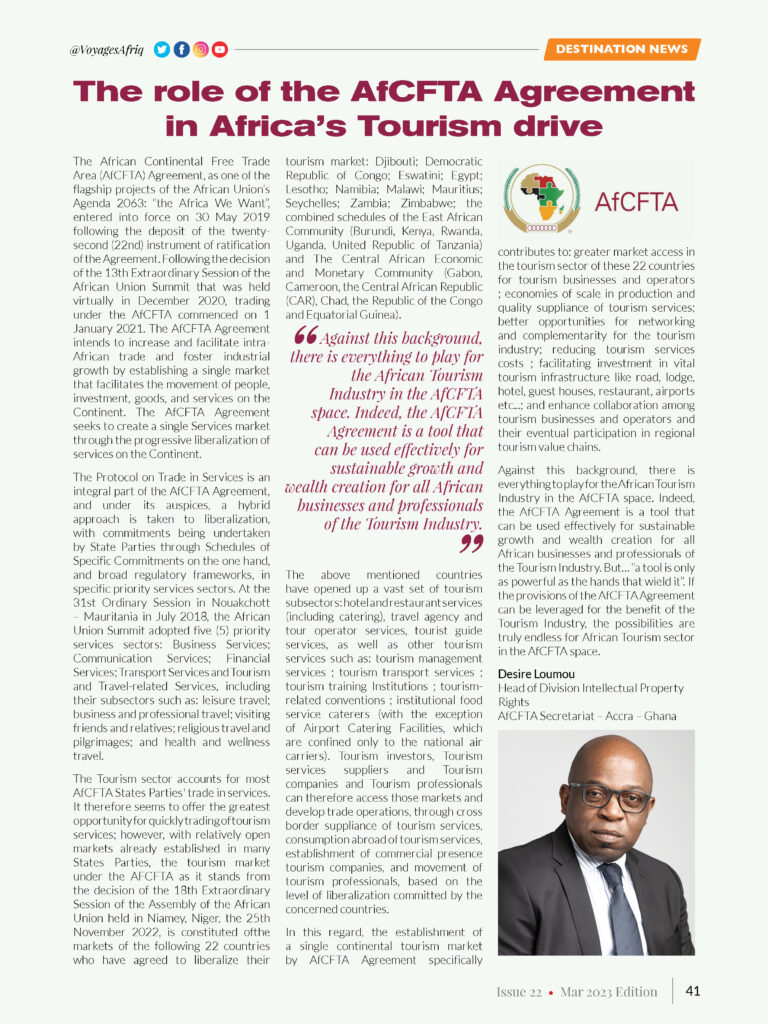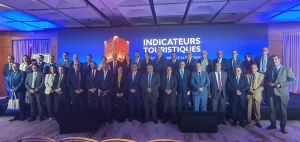The African Continental Free Trade Area (AfCFTA) Agreement, as one of the flagship projects of the African Union’s Agenda 2063: “the Africa We Want”, entered into force on 30 May 2019 following the deposit of the twenty-second (22nd) instrument of ratification of the Agreement. Following the decision of the 13th Extraordinary Session of the African Union Summit that was held virtually in December 2020, trading under the AfCFTA commenced on 1 January 2021. The AfCFTA Agreement intends to increase and facilitate intra-African trade and foster industrial growth by establishing a single market that facilitates the movement of people, investment, goods, and services on the Continent. The AfCFTA Agreement seeks to create a single Services market through the progressive liberalization of services on the Continent.
The Protocol on Trade in Services is an integral part of the AfCFTA Agreement, and under its auspices, a hybrid approach is taken to liberalization, with commitments being undertaken by State Parties through Schedules of Specific Commitments on the one hand, and broad regulatory frameworks, in specific priority services sectors. At the 31st Ordinary Session in Nouakchott – Mauritania in July 2018, the African Union Summit adopted five (5) priority services sectors: Business Services; Communication Services; Financial Services; Transport Services and Tourism and Travel-related Services, including their subsectors such as: leisure travel; business and professional travel; visiting friends and relatives; religious travel and pilgrimages; and health and wellness travel.
The Tourism sector accounts for most AfCFTA States Parties’ trade in services. It therefore seems to offer the greatest opportunity for quickly trading of tourism services; however, with relatively open markets already established in many States Parties, the tourism market under the AFCFTA as it stands from the decision of the 18th Extraordinary Session of the Assembly of the African Union held in Niamey, Niger, the 25th November 2022, is constituted ofthe markets of the following 22 countries who have agreed to liberalize their tourism market: Djibouti; Democratic Republic of Congo; Eswatini; Egypt; Lesotho; Namibia; Malawi; Mauritius; Seychelles; Zambia; Zimbabwe; the combined schedules of the East African Community (Burundi, Kenya, Rwanda, Uganda, United Republic of Tanzania) and The Central African Economic and Monetary Community (Gabon, Cameroon, the Central African Republic (CAR), Chad, the Republic of the Congo and Equatorial Guinea).
The above mentioned countries have opened up a vast set of tourism subsectors: hotel and restaurant services (including catering), travel agency and tour operator services, tourist guide services, as well as other tourism services such as: tourism management services; tourism transport services ; tourism training Institutions ; tourism-related conventions ; institutional food service caterers (with the exception of Airport Catering Facilities, which are confined only to the national air carriers). Tourism investors, Tourism services, suppliers and Tourism companies and Tourism professionals can therefore access those markets and develop trade operations, through cross border suppliance of tourism services, consumption abroad of tourism services, establishment of commercial presence tourism companies, and movement of tourism professionals, based on the level of liberalization committed by the concerned countries.

In this regard, the establishment of a single continental tourism market by AfCFTA Agreement specifically contributes to: greater market access in the tourism sector of these 22 countries for tourism businesses and operators ; economies of scale in production and quality suppliance of tourism services; better opportunities for networking and complementarity for the tourism industry; reducing tourism services costs ; facilitating investment in vital tourism infrastructure like road, lodge, hotel, guest houses, restaurant, airports etc…; and enhance collaboration among tourism businesses and operators and their eventual participation in regional tourism value chains.
Against this background, there is everything to play for the African Tourism Industry in the AfCFTA space. Indeed, the AfCFTA Agreement is a tool that can be used effectively for sustainable growth and wealth creation for all African businesses and professionals of the Tourism Industry. But… “a tool is only as powerful as the hands that wield it”. If the provisions of the AfCFTA Agreement can be leveraged for the benefit of the Tourism Industry, the possibilities are truly endless for African Tourism sector in the AfCFTA space.
Article by Desire Loumou,
Head of Division Intellectual Property Rights
AfCFTA Secretariat – Accra – Ghana
This article was first published in the October 2023 Issue of VoyagesAfriq Travel Magazine







